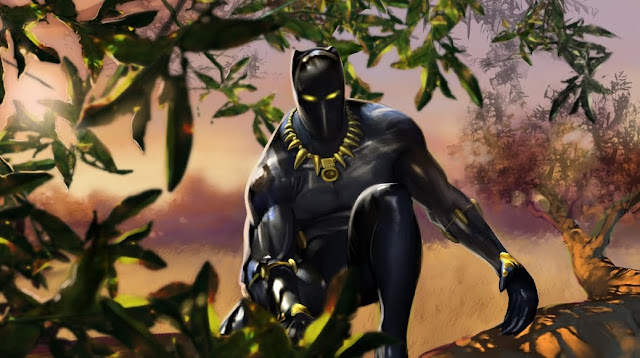 Although the trailer for Black Panther showcased the thought that went into the film beautifully, it didn't do a fantastic job at drawing in the audience, throughout we see a lot of mystery and a lot of conflict, but very little explanation on either account. Even the reference to El Dorado in the first scene of the trailer would need a decent sized scene to explain the parallels of lost cities and precious metals (Vibranium as opposed to gold), which the trailer just doesn't supply. Now I understand that the fact that Wakanada is a mysterious place is a major theme and the trailer is trying to mirror this, but it's very easy to give a film mystery and explain a necessary amount as well. Then again this is a teaser trailer and only establishing the overall theme so maybe I'm being too harsh here.
Although the trailer for Black Panther showcased the thought that went into the film beautifully, it didn't do a fantastic job at drawing in the audience, throughout we see a lot of mystery and a lot of conflict, but very little explanation on either account. Even the reference to El Dorado in the first scene of the trailer would need a decent sized scene to explain the parallels of lost cities and precious metals (Vibranium as opposed to gold), which the trailer just doesn't supply. Now I understand that the fact that Wakanada is a mysterious place is a major theme and the trailer is trying to mirror this, but it's very easy to give a film mystery and explain a necessary amount as well. Then again this is a teaser trailer and only establishing the overall theme so maybe I'm being too harsh here.African culture has been criminally underused throughout Hollywood. (Ooh topical with the many recent racism claims!), to see this just think about what we see in modern films! The Greek myths have been done to death, with films involving various gods, heroes, legends and the like taking centre stage over the past few years, most recently being Wonder Woman featuring her amazon origins (brilliant film by the way). Also in the process of being milked are the Norse myths, you'd be hard pressed to find someone who hadn't heard of Odin the all father or Thor these days. Native american burial ground are such an overused trope that they're now a joke in pop culture and looking back a couple of generations we see the enormous overuse of Asian culture with ridiculous amounts of marital art and samurai movies (okay maybe not all of Asia is equally represented either). And of course, European and American history has been run into the ground over and over again.
But one of the most notable exceptions to this list is THE WHOLE FUCKING CONTINENT OF AFRICA!!
 |
| T'Challa is not amused |
The ridiculous amount of unexplored concepts makes for a goldmine of original ideas, something which Hollywood and Western media is severely lacking currently, and there are several points about this film which dramatically increase its appeal to a far larger audience. Firstly the inspired fusion between the enormously popular sci fi genre with these underused concepts means it could be everything Indiana Jones 4 tried to be!
Secondly, it has what I like to call the nostalgia factor. Several decades ago there was a boom in adventure films, when the classics such as Indiana Jones and The Mummy rocked the world of our parents. If this is done correctly, the parallels of El Dorado could make for an adventure like concept in the film and the atmosphere of mystery and intrigue similar to what was inspired by the greats. The fact that it's also drawing inspiration from the current geopolitical mess that is our worldwide political system should also make it an interesting watch.
Finally, the fact that it's a Marvel film alone should make it extremely successful. In order to prove this, I took the data from IMDb on gross income for all marvel films since phase 1 (in USD) and compiled it into a handy chart of estimated budget (I couldn't find actual figures for budgets or breakdowns anywhere), profit and the profit to budget ratio.
So the black line is the average profit : budget ratio, scaled so that 400 million is breaking even (1:1). Although it's skewed because of the gaps between the phases and my Microsoft Word refusing to ignore them, it's still pretty obvious how successful, with the only loss being on The Incredible Hulk. And it's also worth noting that Guardians of the Galaxy 1 and Ant Man, which featured far more obscure characters than Black Panther did ridiculously well. Anyone who's seen them knows that if there's one thing that Marvel do well, it's pull off the unusual incredibly. Also worth noting that Captain America Civil War, where they introduced the character, has extremely high profit and therefore viewers.
And so that's basically everything I have to say, if this film is a major success, it could be a major turning point in Hollywood inspiring films with origins in lesser known cultures and a far more interesting world of cinema than the endless cycle of remakes and indie films that it seems to be tending towards at the moment. Thanks for reading!! Au Revoir!
Image credit goes to Marvel.



